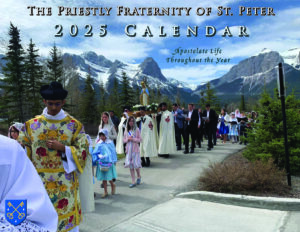For the Defeat of Enemies: Devotions from the Roman Missal
With today being Election Day in the U.S., knowing what is at stake, as we offer our Rosaries and implore the Mother of God for a happy result, we also take note of these prayers from the Missale Romanum for devotional use.
We beseech Thee, O Lord, to crush the pride of our enemies, and humble their insolence by the power of Thy right hand. Through Christ our Lord. Amen.
Look down, O God, our Protector, and defend us from the perils of our enemies, that all trouble being removed, we may serve Thee with quiet minds. Through Christ our Lord. Amen.
We beseech Thee, O Lord, mercifully to receive the prayers of Thy Church: that all adversity and error being destroyed, she may serve Thee in security and freedom. Through Christ our Lord. Amen.
November 3, 2020

The One Thing that is Certain
We have commented a great deal about society and politics over the last few months, as there are many critical matters immediately at hand. Nonetheless, we can lose ourselves a bit in all this and forget that, no matter what happens, God is still in charge and He is always faithful to His promises to those who keep His word.
Ven. Fulton Sheen comments that the real crisis modern man faces is that he has forgotten that he has a soul to save.
Many are unaware of what has taken place in history for salvation; like sheep without shepherds, they do not know – or do not want to know – that there is only one Way, Truth, and Life that answers the most profound questions of the human heart and soul.
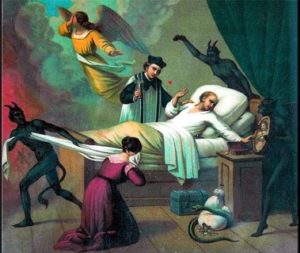 If a man loses his soul, it is his fault, not the God who came searching for him, who called out from a Cross, and who kept searching for him every moment of his life until the allotted time ran out.
If a man loses his soul, it is his fault, not the God who came searching for him, who called out from a Cross, and who kept searching for him every moment of his life until the allotted time ran out.
That is the real tragedy of the crisis, when all that was necessary was that the soul stop running and turn towards Christ – Deus tu conversus vivificabis nos.
For the repentant sinner, it would not have been a long walk back to Him either, as he would have discovered that Christ had been right behind him all along. The damned soul just ran off the precipice where Christ could no longer follow, into the abyss of everlasting weeping and gnashing of teeth.
As uncertain as this life can get at times, Catholics know that death and judgment are certain for every human being.
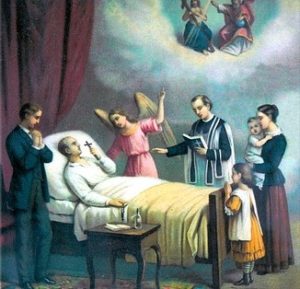 For those who die in a state of grace, that is, in God’s friendship where the soul bears a true reflection of the very divine life itself, eternal beatitude is now certain; the soul will appear before its eternal Savior and Judge for its particular judgment donned in its wedding garment, ready to receive the commendation from Christ: Euge serve et bone! “Well done, good and faithful servant! Because you have been faithful over a few things,” – that is, you have safeguarded the grace of Baptism given to you – “I will put you over many.”
For those who die in a state of grace, that is, in God’s friendship where the soul bears a true reflection of the very divine life itself, eternal beatitude is now certain; the soul will appear before its eternal Savior and Judge for its particular judgment donned in its wedding garment, ready to receive the commendation from Christ: Euge serve et bone! “Well done, good and faithful servant! Because you have been faithful over a few things,” – that is, you have safeguarded the grace of Baptism given to you – “I will put you over many.”
But before our Savior can complete His invitation to enter into “the joy of thy Master” – the Beatific and eternal Vision of the Holy Trinity as It truly is, some souls must take notice of something not quite in place about themselves.
Unimpeded by the body, now without the world and the flesh to distract it or attach itself to, the soul stands before Christ with full realization that it was made and redeemed by Him, and that He has full claim on it.
In the presence of Perfect Truth, Light, and Love that illumine the entirety of its being and irresistibly attract it, the soul notices stains on its wedding garment – the rust marks of disordered attachments, unrepented venial sins, and unremitted temporal punishments of forgiven sins – and it realizes how all sufferings and trials had been providentially sent by its Savior, standing before it with His Cross in hand, and were meant to cleanse it during its earthly sojourn, but went neglected somewhat.
The soul wants to be purged of this all before it enters the wedding feast. The irresistible draw towards Christ to be with Him forever in glory actually compels the soul to desire the cleansing fires of purgatory, so as to render it fit for that glory, and it willingly takes its place there.
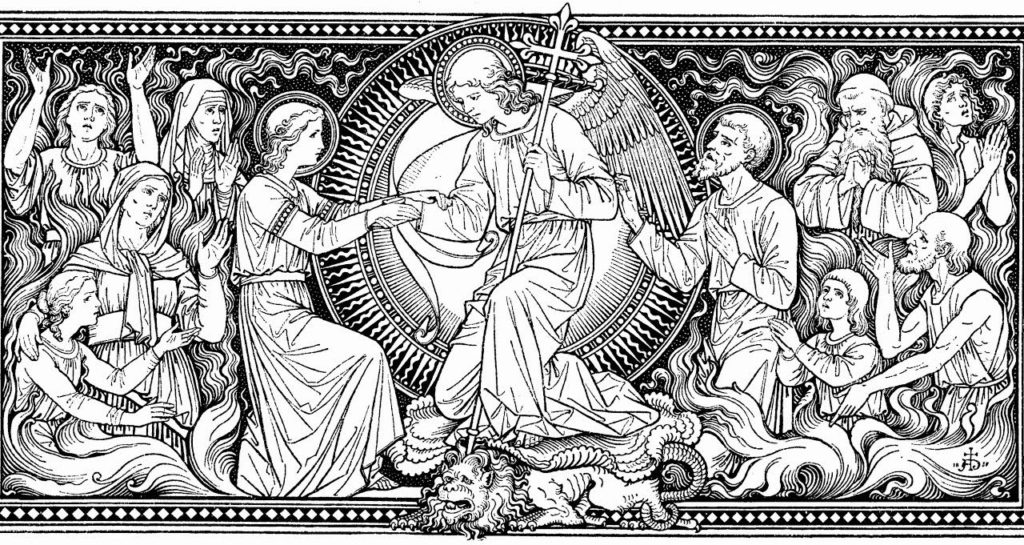
The soul is both holy and poor.
Holy because it is confirmed in grace; it knows it will definitely see God and be with Him forever, and there is a genuine joy that comes with that.
But it is poor because it had to withdraw itself from Christ for a duration appointed by Him, which was wholly avoidable; it thirsts for that Beatific Vision with an indescribable longing that requires the Masses, prayers, and suffrages – that is, the charity – of the faithful here on earth to shorten the wait.
It suffers intensely, both in pains of loss and sense, and so these souls pray and plead that they obtain their eternal rest, with the bona fide promise to pray for those who assisted them upon release.
It is All Souls’ Day. November is the month of the Holy Souls, amidst whom we may one day find ourselves.
Pray for the souls in Purgatory always, that they be loosed from their sins, and remember daily the usefulness of the trials our loving Savior sends, to help avoid it ourselves when He calls us from this life into eternity.
November 2, 2020

Gaudeamus!!!
We know well how our Blessed Lord gave His Apostles moments of wonderful consolation before leading them down a difficult path, like His glorious Transfiguration before the Passion.
His Bride the Church does the same.
Lent has its Laetare Sunday to encourage us through the great fast. Soon enough we will be in the little fast of Advent, and Gaudete Sunday will offer us a welcome bit of rose-colored joy just before the winter Embertide and the last stretch of awaiting the Messiah.
This weekend we find ourselves entering the Last Sundays of Pentecost, when Holy Mother Church begins to sound an increasingly ominous alarm.

The 22nd Sunday after Pentecost sees the striking appearance of the De profundis, from the Mass of the Dead. On this Sunday it is prominently featured in the Introit, and in the 23rd, 24th, and all the resumed Sundays it will be a constant drumbeat in the Offertory. Though the liturgical books still call for green throughout, we might find it helpful to consider it not so much the lush green of growth as it was during Summer, but now the pale green of Death, the fourth horseman of the Apocalypse (Latin pallidus, Greek chloros).
Liturgically speaking, we have reached the end of the world.
The time is up. The final cataclysm is upon us.
Whatever our petty cares and wants were before, they seem very superficial now. The Apocalypse that our mortal humanity dreads is now rolling over cities and hills like an unstoppable pyroclastic flow.
There is nowhere to run. Nowhere to hide.
Our lives are now laid bare for God to judge, before which we can only cry out “mercy, mercy!”
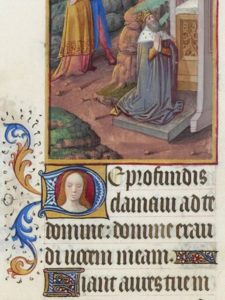
All the men on earth, whether they want to or not, are now compelled to join us in that pleading, desperate Introit of the 22nd Sunday:
If Thou shalt observe iniquities, O Lord, who shall endure it?…from the depths I have cried to Thee, O Lord: Lord, hear my voice.
This particular year the liturgical Apocalypse has become a little too vivid, hasn’t it?
The normal economy (oikonomia) of our lives was interrupted by a frightening revenant crawled out from a bygone age: a worldwide pandemic. Then followed the reactions to it: deaths, food shortages, quarantines, lockdowns, suspensions of the sacraments, unemployment, bankruptcy, tyranny. These were soon joined by riots, iconoclasm, vandalism, and murder. And yet another ghastly revenant, another undead ghoul known as Marxism was somehow reanimated by some dark and infernal art. Beset by these evils, we strain our ears to hear the faintest encouragement from the shepherds of the Church—and are too often met with silence.
Next Tuesday, our American readers face an election. But it is one somewhat unlike previous elections, where each side hoped for a resounding victory to implement competing visions on society.
This year, both sides seem to be struck with a foreboding that, either way, the nation is in for it. That a glorious victory for one camp will only deepen the implacable rage of the other, leading us inexorably to the same violent outcome.
Perhaps.
It may not be God’s will to prepare us for the end just yet. It sure feels like an end, all the same.
And yet…..yet….
Lest we get too caught up in the bleakness of it all, in the hellish hatred and violence and betrayal around us, lest we let the news drive us to despair and hopelessness, we realize that the 22nd Sunday after Pentecost falls, in this Anno Domini of 2020, on November 1st.
It is, thus, superseded.
It was not superseded last year. It will not be superseded next year.
But in this Year of Our Salvation 2020, the loyal sons and daughters of Holy Mother Church will not hear the desperate Introit of the 22nd Sunday. They will only hear the commemoration of its more hopeful Collect:
“O God, our refuge and our strength, the very author of our piety, be present to the devout supplications of Thy Church, and grant that what we seek in faith we may effectively arrive at.”
This Sunday, what we seek in faith will actually be seen, as we lift up our voices with the first words of Holy Mass, and ring out the Introit:
GAUDEAMUS omnes in Domino!
“Let us all rejoice in the Lord, celebrating a feast in honor of all the saints, in whose solemnity the angels rejoice, and join in praising the Son of God. Rejoice in the Lord, ye just: praise becometh the upright!”

Almighty God has seen fit to prepare for us, through a calendar worked out centuries ago, a liturgical consolation in a year we badly need one. It is a “Gaudete” Sunday more spectacular and more joyous than the actual one…with its vestments set out in brilliant white and gold rather than mere rose.
This year the Apocalypse begins with all the glory of All Hallows, and a window into the heights of heaven.
So let the End begin, liturgically or actually, however Our Lord has foreordained it.
We His children can see how tenderly He has allowed us this glimpse of Paradise just when we need it the most. We see these rays of bright heaven beaming into our dark world like a glowing ladder calling us up to the higher life.
Come what may, the greatest victory is won. Christ has prepared for us a new kingdom. Christ has built for us a new and perfect world that will never be taken away.
Gaudeamus omnes! Gaudent angeli! Exsultate, justi! Rejoice all! The angels rejoice! Rejoice, ye just!
Three times rejoice, rejoice, rejoice!!
Do not let this Sunday pass without thanking God for this joyous consolation that Holy Church has prepared for us.
And whatever we see in the weeks and months ahead, let us always remember all the saints and angels encouraging us, praying for us, and cheering us on, as we prepare for the final leg of our journey home.
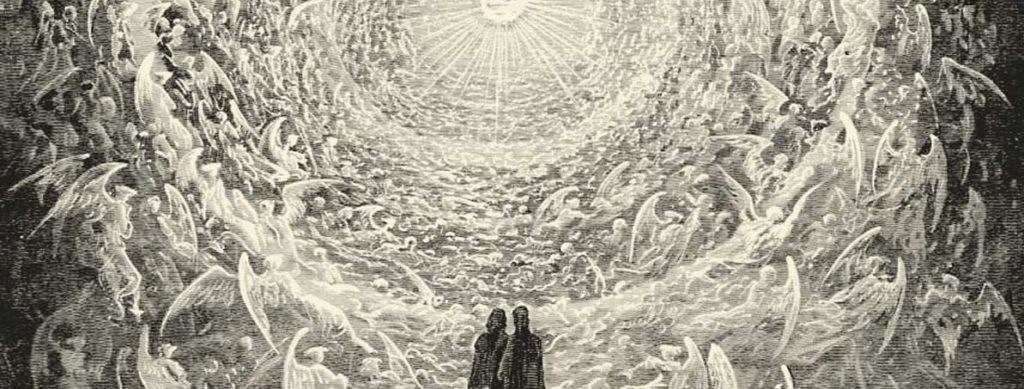
Blessed are they that suffer persecution for justice’s sake, for theirs is the kingdom of heaven.
October 30, 2020

Voting and the Lesser of Two Evils
With the U.S. elections a few days away, questions tend to arise among well-meaning Catholics about whether they can vote for any candidate who in some way supports abortion.
As a result, they consider whether they should vote at all if there is not a completely pro-life candidate, or if it worth voting for a non-viable third-party candidate who is most aligned with the Church’s moral and social teachings. Some would argue that not voting or voting third party only serves to help the worse of the two viable candidates, and that Catholics are morally obligated to utilize their votes to prevent that from happening.
While this is something to take under serious prudential consideration, especially when someone senses his vote is more ”against” one candidate than “for” another, the Church leaves an individual with freedom in this regard and provides the moral principles to guide the decision.
One thing that needs to be kept in mind is that there is a hierarchy of moral evil; some acts are worse than others.
The Church posits that there are five “non-negotiables” when it comes to deciding on a candidate to endorse: abortion, euthanasia, embryonic stem cell research, human cloning, and the redefinition of marriage.
The first four involve the direct and willful destruction of innocent human life; the fifth one militates against the very institution upon which society depends for its continued existence.
While there are other evils, these five must be considered first when deciding whom to vote for as well as which political party to endorse. Candidates aspiring to national office would be expected to execute the party’s platform (this may or may not be as pronounced at local-level elections). Regarding the political parties, it can be well-argued that if a party’s platform officially endorses all or most of the non-negotiables, a Catholic cannot be aligned with it without committing sin, as doing so could be considered formal cooperation with evil.
So the question arises about what to do when two viable candidates for a national office, either personally or by party affiliation and endorsement, violate one or more of the non-negotiables.
In such cases, a Catholic may vote for the lesser of the two evils.
But how to determine that?
 We must keep in mind that a Catholic can never formally cooperate with abortion; he cannot support it or vote for a candidate because the candidate will support it. That said, given the hierarchy of the non-negotiables, a candidate (or party) that supports abortion is the worse of the two, even should the other support some of the lower ones but not abortion (for instance, when a candidate is against abortion but may favor research on already existing stem cells from aborted embryos).
We must keep in mind that a Catholic can never formally cooperate with abortion; he cannot support it or vote for a candidate because the candidate will support it. That said, given the hierarchy of the non-negotiables, a candidate (or party) that supports abortion is the worse of the two, even should the other support some of the lower ones but not abortion (for instance, when a candidate is against abortion but may favor research on already existing stem cells from aborted embryos).
A candidate should be eliminated from consideration if he fails at this point. As Trent Horn comments in his article Can Catholics Vote for Pro-Choicers? which should be read in its entirety (https://www.catholic.com/magazine/online-edition/faith-abortion-and-voting-part-4) :
“If the only relevant difference between two candidates were that one supports the legal killing of unborn human beings and the other does not, then there would be almost no chance there is a proportionate reason to vote for the pro-legal-child-killing candidate.”
Nonetheless, if both support abortion, one would need to see which other non-negotiables are compromised, and a vote would be decided based on who is less likely to advance the evil causes at hand.
Some Catholics may still find themselves torn though. While much emotion and passion surrounds the elections, revealing a polarized and divided electorate, we are responsible before God for making a reasoned, dispassionate, and morally correct decision about whom we vote for.
As Horn states:
Catholics could not vote for a candidate who endorses an intrinsic evil such as legal abortion merely because they prefer that candidate’s party or because they find the other candidate unlikeable or even morally reprehensible in his personal conduct. And as we noted last time, voting for a pro-abortion candidate also wouldn’t be justified merely because you disagreed with the other candidate’s views on an issue Catholics could reasonably disagree about.
The Church’s moral guidance does well to help us eliminate a person whom a Catholic cannot morally vote for, leaving us free to vote for the remaining candidates.
But given the serious situation facing the country, it is also worth considering: does a circumstance exist in some places that should make one think carefully before voting for a third party?

On Rights of Citizens, Part 2
It is obvious that a relaxed stance on immigration and/or the dissolution of borders not only creates a national safety issue, it also serves to undermine the state’s own autonomous sovereignty, thereby gravely violating the rights of its citizens who contribute to its welfare and upon whom they rely.
Indiscriminate amnesty, or amnesty on a large scale, compromises the common good of a nation’s citizenry because it does not provide a forum for proof of allegiance, all the while imposing undue burdens of wealth and resources on the citizens who are now forced to support those who cannot support themselves.
This is a failure in charity, and extends well beyond our Christian maxim of welcoming a stranger; for someone trying to be an upright citizen, and who has responsibilities to one’s own fellow citizens first (especially to members of one’s family), this is not a matter of greed versus generosity.
Although we are not blind to the humanitarian element, there are considerable limitations about what reasonably can be done, especially as this seems to have come about with the sanction of those who have care of the common good, an evident abuse of power. The compromise of a state’s integrity helps no one, and serves to increase the domination of many by a few, leading to greater violations of human rights and many bad fruits if this continues, such as an increase in violent crime, drug and human trafficking, and compromised job markets.
Amnesty, then, is no answer, but part of the problem.

Instead, those who have care for the common good at a national level, while protecting its citizens, are obliged before God to see that, in establishing a process for citizenship, the expectation of loyalty to the state is understood, which means suitable and truthful education in the history of the nation and a willingness to adapt to the regular method of commerce and language of its citizens. (As a corollary, governors who have the requisite authority are obliged to make efforts to correct errors in this education within its public institutions.)
At the same time, to the degree it is has power and influence, a sovereign nation has some responsibility to put pressure on other sovereign nations to correct themselves where their public policies violate human rights. This can come in various forms, including sanctions.
Nonetheless, willing collaboration with such nations, economically or otherwise, seems to violate the duty to protect the common good; making another sovereign state the resource, economic, or manufacturing slave of another adversely affects the common good of both, as the knowing violation of human rights in one state cannot be used to safeguard the citizens’ rights of another.
Remember that the common good does not mean that day-to-day life in a country is easy, but that its government is respectful of fundamental human rights to life, liberty, and property, and permits its citizens to advance them.
It is not the objective here to advance a specific solution to these complex problems, but rather to give reasons as to the position we ought to take as Catholics.
The more removed or disconnected citizens become with their nation’s past, the more disrespectful or apathetic they become towards their nation, and the more power revolutionaries take to impose new and politically correct versions of its history upon citizens in an effort to undermine the common good and change its trajectory.
The individual sovereignty of our nation is under attack, and our natural law inclination as citizens to love and preserve the identity of our country of allegiance has been violated.
Nonetheless, we must remember that bad rulers are generally sent by God as a chastisement for the sins of a nation, and a solution is found only in the conversion of the people under such rule.
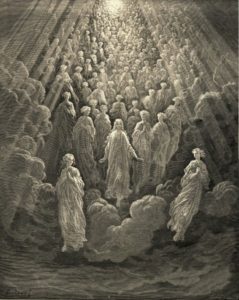 As baptized, we must remember that we are citizens of heaven first, and so for us it begins with the basics of respecting the human rights of all, voting for leaders who will support this, and promoting the common good within the framework of the family, the building-block of any society.
As baptized, we must remember that we are citizens of heaven first, and so for us it begins with the basics of respecting the human rights of all, voting for leaders who will support this, and promoting the common good within the framework of the family, the building-block of any society.
By doing so is the connection re-established with the sacrifices of many in the past to secure the good of a nation and by which, in our own cases as citizens, we stand ready to re-occupy it for love of God, neighbor, and country.
October 29, 2020

On Rights of Citizens, part 1
Immigration has been a hotly contested issue over the past twenty years and the more recent presidential administrations, to the point of becoming a crisis. And it can be argued that widespread illegal immigration can be tantamount to an occupation of sorts, a veritable onslaught to dismantle national sovereignty, blur borders, and establish a new and dependent (or controllable) electorate.
When we look at the Ten Commandments, we note that the first three deal with our duties to God; the last seven deal with our duties to neighbor. The latter are consequences of the first three.
At the top of our duties to neighbor is the Fourth Commandment: Honor thy father and thy mother, which is all about respect for lawful authority, beginning with one’s parents.
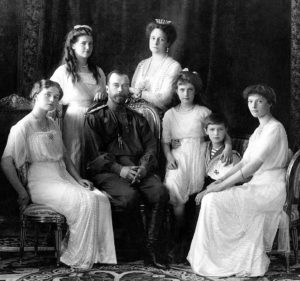 The family is the basic building block of a society, of a state; families comprise a state and are therefore prior to it in origin. The government is put in place to see to the true welfare of its constituents, which is called the common good. Therefore, members of a state should rightly expect their government to preserve and protect their true rights so that they can pursue temporal and eternal happiness as a whole. (Notice how God and religion are indeed constituent to common good, and that the state is not the grantor of all rights.)
The family is the basic building block of a society, of a state; families comprise a state and are therefore prior to it in origin. The government is put in place to see to the true welfare of its constituents, which is called the common good. Therefore, members of a state should rightly expect their government to preserve and protect their true rights so that they can pursue temporal and eternal happiness as a whole. (Notice how God and religion are indeed constituent to common good, and that the state is not the grantor of all rights.)
The purpose of the federal government is first and foremost to protect the rights and common good of the citizens it governs. Consequently, the state is responsible for making laws that see to the maintenance and safety of its members, as well as making due provision for the future to ensure that the state continues to exist.
If the state does its job, it has the right to expect allegiance and respect from its members. At the most fundamental level, this entails respect for internal law and external borders by all members of a state, both the governed and the governors.
Internal law sees to the smooth governance of the members. The external borders determine where the jurisdiction of the state extends, and also who benefits from the state’s protection and who does not. In other words, a state exists to provide stability for a particular human society. As a result, those who inhabit a particular state have duties towards it.
This is where the distinction between human rights and rights of citizens is of tremendous importance.
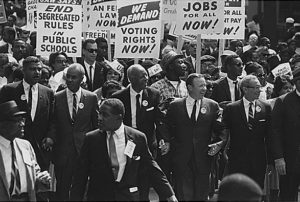 The distinction between human rights and citizen rights is based upon a relation of justice; that is, a relation of mutual obligation and dependence between a government and those governed by it.
The distinction between human rights and citizen rights is based upon a relation of justice; that is, a relation of mutual obligation and dependence between a government and those governed by it.
All in all, human rights are much broader in scope than citizen rights, as the former pertain to the rights every human being has to life, liberty, and the lawful possession of private property.
Citizen rights, however, are more specified, in that certain human rights require assistance from a specific sovereign government in order to be better realized, all in the interest of promoting the common good, to which we share responsibility, for things we cannot attain individually but collectively.
This includes greater employment opportunities for the able-bodied and able-minded, development of resources for national advancement, the creation of wealth, public safety, police, public health, and national self-defense. Citizen rights are acquired by contract with a state – a state which is determined by borders and common law – and a contract which is entered into either by birth or by choice, under which a citizen is now subject and which a citizen supports.

Since they contribute and since they pledge allegiance to their state – meaning they stand ready to defend it, citizens of a nation alone have rightful and just claim on the benefits from their government.
Therefore, although a state can make due provision for those who may live and work within its borders who are not citizens, it is obliged to ensure that citizens’ rights are not infringed upon by their presence, because that would upset the common good. In considering its relationship then with other sovereign states, especially for purposes of trade, a state must realize, in efforts to preserve and promote human rights for all, that its primary interest is in the protection of the rights of its citizens.
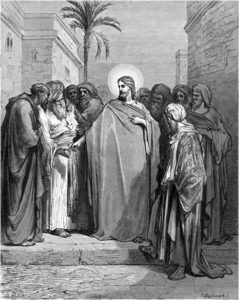 This is what Christ meant when He commanded rendering to Caesar what is Caesar’s and to God what is God’s; these should never be in opposition, since what belongs to Caesar also belongs to God.
This is what Christ meant when He commanded rendering to Caesar what is Caesar’s and to God what is God’s; these should never be in opposition, since what belongs to Caesar also belongs to God.
A citizen is one who is bound in justice to support the state he lives in, in return for the stability a state should provide. Those who are not citizens of a specific state do not possess any of these rights and entitlements because they are not strictly bound to support it.
So, in virtue of its duty to protect and promote the common good for those under its care and responsibility, a sovereign government has the right to know who its citizens are and also who are non-citizens living within its borders. It has the right to increase or limit the presence of non-citizens, and even certain nationalities of non-citizens for a just cause, including immigration and the process towards legal citizenry.
The citizens have a right to expect this, since they have first claim on the limited resources of a nation. They are the ones who must support the state, so the government also has the right to impose restrictions on the benefits non-citizens receive while living within its jurisdiction.
Thus a government can demand remuneration of some kind from legal non-citizens while, at the same time, extending only limited, albeit just, benefits in return.
October 28, 2020

Enroll in Our 2020 Christmas Card Novena
Yes, that time of year is fast approaching!
This year we’ve streamlined the whole process and made it simple and convenient to get FSSP Christmas cards online.
Just go to our Christmas Card Novena page here: https://fssp.com/novenas/christmas-card-novena/
There you can enroll your loved ones in a Novena of Masses that will be offered for our benefactors from December 17th to 25th at our chapel at the North American headquarters, and offer a donation that will be very important to the Fraternity as we continue to grow above the 300 priests and over 150 seminarians we currently have.
With your gift you will also receive beautiful Christmas cards to let everyone know they will be remembered in the Novena of Masses—and to remind them of the humble Infant Who came to save us all.
Just use the form online to let us know how many 12-card sets you need. (Due to high demand, please call the office if you need more than 9 sets).
October 26, 2020

All Men Are Under the Dominion of Christ
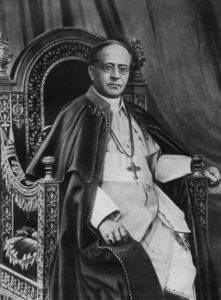 An excerpt from Quas Primas:Encyclical of Pope Pius XI on the Feast of Christ the King
An excerpt from Quas Primas:Encyclical of Pope Pius XI on the Feast of Christ the King
It would be a grave error, on the other hand, to say that Christ has no authority whatever in civil affairs, since, by virtue of the absolute empire over all creatures committed to Him by the Father, all things are in His power.
Nevertheless, during His life on earth He refrained from the exercise of such authority, and although He Himself disdained to possess or to care for earthly goods, He did not, nor does He today, interfere with those who possess them. Non eripit mortalia qui regna dat caelestia.
Thus the empire of our Redeemer embraces all men. To use the words of our immortal predecessor, Pope Leo XIII:
“His empire includes not only Catholic nations, not only baptized persons who, though of right belonging to the Church, have been led astray by error, or have been cut off from her by schism, but also all those who are outside the Christian faith; so that truly the whole of mankind is subject to the power of Jesus Christ.”
Nor is there any difference in this matter between the individual and the family or the State; for all men, whether collectively or individually, are under the dominion of Christ.
In Him is the salvation of the individual, in Him is the salvation of society.
“Neither is there salvation in any other, for there is no other name under heaven given to men whereby we must be saved.”
He is the author of happiness and true prosperity for every man and for every nation.
“For a nation is happy when its citizens are happy. What else is a nation but a number of men living in concord?”
If, therefore, the rulers of nations wish to preserve their authority, to promote and increase the prosperity of their countries, they will not neglect the public duty of reverence and obedience to the rule of Christ.
What we said at the beginning of Our Pontificate concerning the decline of public authority, and the lack of respect for the same, is equally true at the present day.
“With God and Jesus Christ,” we said, “excluded from political life, with authority derived not from God but from man, the very basis of that authority has been taken away, because the chief reason of the distinction between ruler and subject has been eliminated. The result is that human society is tottering to its fall, because it has no longer a secure and solid foundation.”
Given at St. Peter’s, Rome, on the eleventh day of the month of December, in the Holy Year 1925, the fourth of our Pontificate.
October 23, 2020

A Promise Kept
For those who watched even short selections of the Senate Judiciary Hearings last week, one had to be impressed with Judge Amy Coney Barrett’s acumen and competency. Her opponents certainly had their work cut out for them. While needing to avoid a repeat of the travesty that surrounded the hearings for Justice Brett Kavanaugh, how were they to confront someone who should be considered an icon of sorts?
Here we have a woman with a quite accomplished law and judicial career, evidently qualified for the nomination, highly educated, and this all amidst being happily married with seven children, essentially a modern woman who “has it all.” They should have been proud to be in the presence of yet another who has overcome the odds and broken through the barriers our “oppressive patriarchal society” has imposed for so long.
It could not be so with them.
Like the Pharisees who prefaced their attack on Christ with hollow platitudes (cf. Mt. 22:16), with coy remarks of respect they sought to ensnare Barrett, drawing her into debates about how she would rule, to “radicalize her” through their questioning in the hope of making it obvious to everyone in the room that she was somehow untrustworthy to hold such an influential position.
But they were also in another bind. Having touted religious freedom all these years (although ultimately as a device for freedom from religion), they could not directly express their concerns (alarm) over her deep commitment to Catholicism. They had to keep a cool head about this and pretend that it was a non-issue, lest they betray their hand.
And they could not. No one could.
As the hearings progressed, the situation started to resemble in some ways a most famous trial that happened two thousand years ago.
Back then, our Lord stood before His judges and maintained a calm composure, completely self-possessed to the point that, in the case of the Sanhedrin, it increased their aggravation and hatred, and in the case of Pilate, it increased his admiration and wonder.
Christ answered legitimate questions only from those who held legitimate authority; otherwise, He maintained His peace, even when His character was dragged through mud and His teachings unto everlasting life were twisted and maligned.
We can wonder if Barrett reflected upon this in the days leading up to her hearings.
Her calm demeanor throughout the four-day process was impressive. She prudently avoided answering questions on how she would rule, as such questions were beyond the scope of the hearings. After all, Justices Ginsburg and Kagan did the same in their hearings. As the frustration of her opponents mounted, they repeated the same questions in different ways, to which she gave the same answer.
Unable to cajole her to talk about all the rulings they wanted and pin her down, especially on abortion, they resorted to foolish questions. And although she did give answers to those, and usually brief ones, her composure said far more than her words.
That is how Christ turned the tables on Pilate at every instance; while Pilate had the authority, he knew Christ was in charge of the narrative.
Judge Amy Coney Barrett seems to have accomplished the same, and her witness indeed gave proof to our Lord’s promise, from which we all can take heart and strength: Lay it up therefore into your hearts, not to meditate before how you shall answer. For I will give you a mouth and wisdom, which all your adversaries shall not be able to resist and gainsay (Lk. 21:14-15).
Let us pray for her confirmation to the Supreme Court.

Two Episcopal Statements on the Declarations of Pope Francis
We direct our readers to the following two statements:
Cardinal Burke’s statement on the Declarations of Pope Francis Regarding Civil Unions
Statement of Bishop Thomas Tobin of the Diocese of Providence
And we reiterate once again our call for recitation of the Prayer for the Ecclesiastical and Civil Authorities during the month of October.
October 22, 2020








